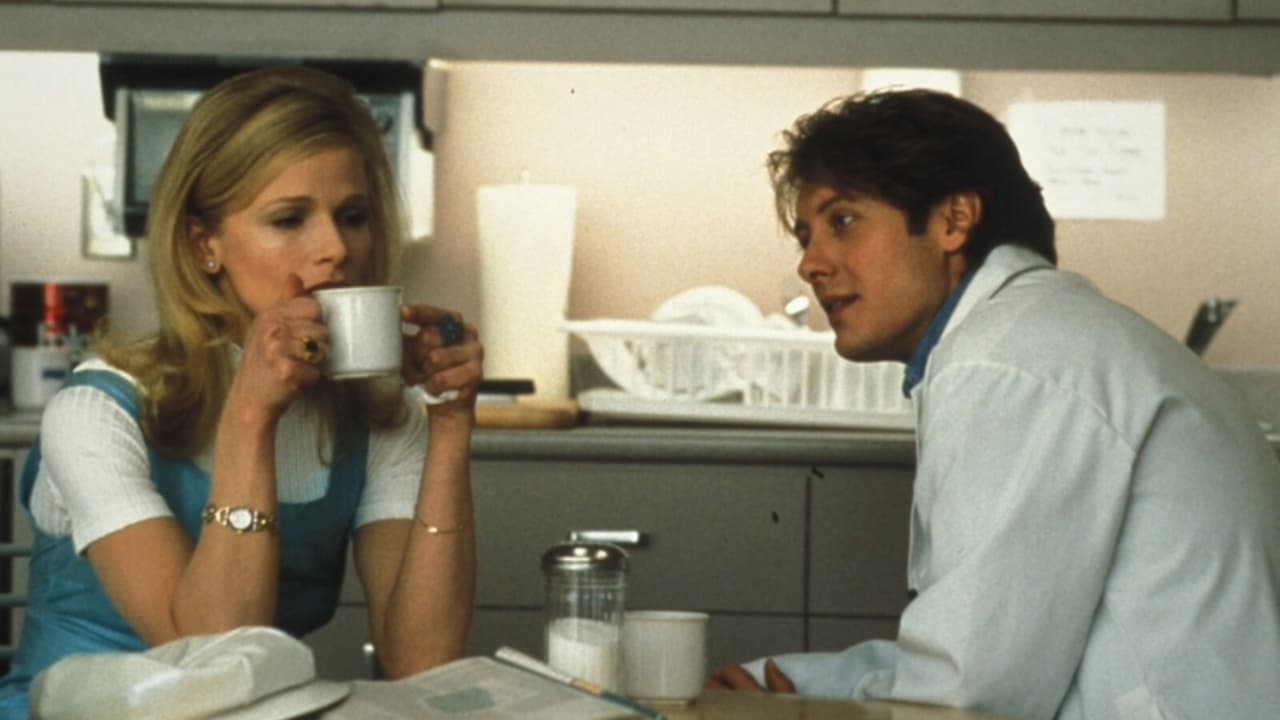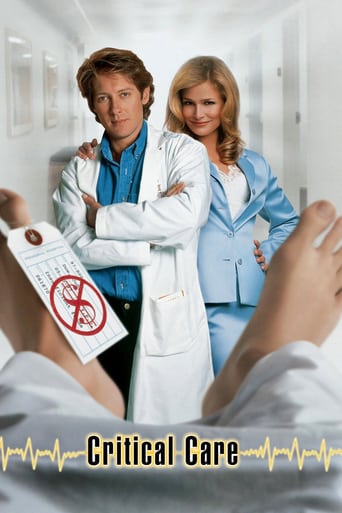

Not bad medical drama hampered by the fact that for a great deal of the film Spader's character behaves like an idiot. This isn't the actors fault, he gives as good a performance as possible considering the actions forced on him by the script. He is certainly supported by a high quality cast in almost every role. Kyra Sedgwick is annoying and not terribly convincing but she is the lone sore spot. Helen Mirren is wonderful as an understanding and compassionate nurse and Albert Brooks a stitch as a loony doctor well past his sell by date. The script has many holes but it does make a strong plea for doctors seeing patients as people not just science projects and sources of income.
... View MoreDirectors as renowned and diverse as Sidney Lumet only come along every so often. This great director had such an incredibly long career as a filmmaker before his unfortunate passing earlier this year. His career spanned fifty years and practically every genre you can think of. Only a few times did Lumet tackle comedy, and Critical Care is one of those times. The movie takes place in a hospital where Dr. Werner Ernst (James Spader) becomes helplessly involved in a legal battle between two half-sisters who are fighting over the $10 million inheritance of their comatose father. Werner has to put up with this feud as well as his senile supervisor, Dr. Butz, played by an almost unrecognizable Albert Brooks, who insists that Werner only take care of patients with health insurance. Werner must maneuver around the legality of the hospital in order to do what is right for the patient in this twisty, wacky, nutty, and all around fun flick from the late and great Sidney Lumet.Critical Care is a fairly straightforward film when you boil it down. There isn't a lot going on here, but what it has to offer is entertaining enough. It's a witty little film with fun characters and great performances. I thoroughly enjoyed James Spader as the film's lead, as he carries the film well, but the film is really lifted up by its supporting cast. Helen Mirren plays the head nurse on Spader's floor, who has a profound outlook on life, even if she has very unorthodox ways of showing it. She isn't in every scene but when she stops by it always seems she is there to give some sort of advice or perspective on the wacky situation the other characters find themselves in. Jeffrey Wright has a small part as a dying patient who sees visions of the devil coming to take his soul. The devil is played by highly unexpected Wallace Shawn. The sub story that develops between Wright and Shawn, as well as Mirren, is a fascinating parallel to the central story of the film.Kyra Sedgwick and Margo Martindale play the two half-sisters fighting over their father. Sedgwick is a seductive model whose devious ways get Spader into more trouble than he bargained for. Martindale is a deeply religious woman who uses God as her safety net for everything she says about her father and the situation she is in. Her over the top character effectively pokes fun at devout Christians who believe Jesus is the answer to all problems, something I'm always a fan of. But my favorite character of them all is easily the curmudgeonly Dr. Butz, played incredibly well by Albert Brooks in an hysterical role. Dr. Butz is grumpy, unethical, and very technologically challenged, making for some silly yet amusing running jokes in the film. I looked forward to every scene with Brooks as the nutty geezer and was always satisfied with whatever scene he appeared in.When you get right down to it, Critical Care is a film that you watch, enjoy, then forget. I really liked this flick. It made me laugh and it didn't waste my time or insult my intelligence. It's simple enough and not something to do back flips for. It's a small film, very minimalistic, but makes the most out of what it has. The actors are great and the variety of characters are all fun. I couldn't see myself watching this film again but it was at least an effective use of an hour and forty minutes of my time.
... View MoreIt is hard to say HOW this film escaped my radar..... Just saw it in IFC and was amazed at the breadth of talent on it along with the wonderful ideas.Would like to see it a couple of more times just to digest it.Don't own a TV - my girlfriend does; I only watch it when I see her.Why on earth this movie did not get proper distribution ?Strongly recommend.Wallace Shawn's character made me think of All that Jazz - don't ask me why. Maybe due to their life/death discussions.Ed Hermann was really astonishing as a lawyer.Kira Sedgwick and James Spader weretruly wonderful together.Hope to hear some feedback.
... View MoreSidney Lumet shows why he is a unique voice in the American cinema with his take on the state of medicine in this country. Mr. Lumet, working on the screen play by Steven Schwartz, based on Richard Dooling's excellent book, presents us a story about what's wrong with our health care system. His acerbic take on the way some physicians conduct themselves goes underneath the surface as he explores what happens when there's a complication as a young doctor is drawn into a family drama that involves the hospital where he is an intern.If you haven't seen the film, maybe you would like to stop reading.We are taken to an new intensive care unit of a big hospital. Everything is so impersonal that one doesn't get any feeling of warmth in the way the people are seen in their beds, as they are being treated from different ailments. Young doctor Ernst is an intern assigned to that area. He shows signs of fatigue because of his long hours on duty.Our attention is directed to the patient on Bed 5, an older man who is comatose. His younger daughter, dressed to the nines, comes to pay a visit that seems more of an excuse to flirt with the doctor, rather than her concern about the state of her own father who doesn't show any signs of life. Dr. Ernst is dazzled by the beautiful Felicia. When he asks her to go to dinner, she accepts all too readily.At the same time we are introduced to the head nurse of that area, Stella, a woman who has seen suffering and death frequently. She goes to assist Bed 2, a young black man who has a kidney problem. All this patient wants is to die. Who can blame him? His parents, on the other hand, have a different idea. This man is visited by a sinister figure who stands, as a devil figure. Stella wants to help, but she her hands are tied.Young Dr. Ernst has his own troubles. He works for a doctor that keeps paging him, but when he goes to his office, the man, doesn't even remember calling him. This man is suffering from a loss of memory caused by his heavy drinking. Dr. Butz is the worst nightmare as the head of the department. All he cares is about if the patient has an insurance policy that will pay whatever he, and the hospital will demand. Bed 5, alone, has been billed for more than a hundred thousand dollars!Dr. Werner Ernst in a moment of carelessness falls for Felicia's charms. Little does he knows that she is using him for her own greedy purposes. Felicia, and her sister Connie, are battling because of the clause in their Bed 5 father's will. A lot of money is at stake; each woman is fighting for it in their own dirty way. Dr. Ernst has an epiphany when the nun-like figure comes into Bed 5's room and confronts the doctor with some facts that resonate in the young doctor.Finally, everything comes to a head as the two sisters bring law suits against the hospital. This is when the legal system comes into play. We see the ugly faces of all the different factions. In a great confrontation at the end of the film, we see all different lawyers and doctors as they prepare to fight. Dr. Ernst, in a daring moment gets the warring parties together.James Spader, as Dr. Ernst, is nothing short of perfection. His take on this young intern, in the middle of the mess that has been created around him, is amazing. Helen Mirren, as Stella, the kind nurse makes another invaluable contribution to the film. Kyra Sedgwick, is Felicia, the pretty young daughter who doesn't care about the dying father. Margot Martindale plays Connie, the other sister. Jeffrey Wright is the patient Bed 2 in a great performance. The surprise of the film though, is Albert Brooks, whose Dr. Butz is one of the best characters of his career. The rest of the cast is first rate.Sidney Lumet is to the congratulated for tackling this thorny issue about what's wrong in the country in the fields of medicine, law, and insurance.
... View More